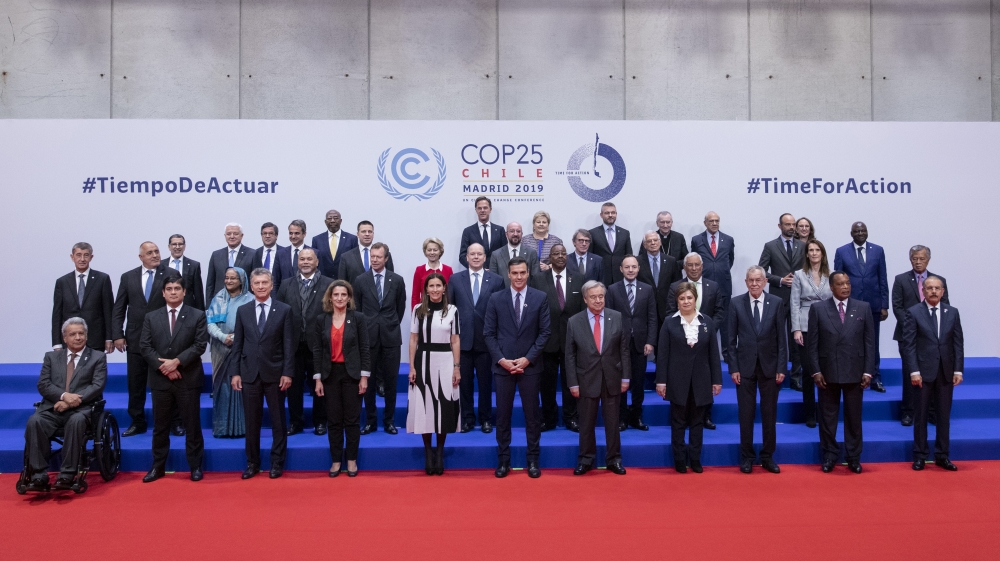Climate Change - Turning talk into real action
- Category: General
- Date: 07/01/2020

Turning talk into action
The recent COP25 climate talks in Madrid saw politicians, negotiators and campaigners gather for two weeks of climate debate and discussion. But what did the conference achieve and what does it mean for the environment?
“Since 1990, the increase in greenhouse gas levels has made the heating effect of the atmosphere 43% stronger”
On Friday 6 December, over 500,000 people marched through the Spanish city of Madrid. Their message was loud and clear: that key decision-makers within governments, businesses and individuals around the world need to come up with a plan to reduce carbon emissions and tackle the impacts of climate change.
Already large in number, the protest was given further weight by the arrival of Greta Thunberg, who had a stark message for the world’s leaders, stating that the global campaign of school strikes “achieved nothing” because greenhouse gas emissions had continued to rise.
“We can’t go on like this,” said the 16 year-old. “It is not sustainable that children skip school and we don’t want to continue. People are suffering and dying today.”
Resolutions for change
The message of Ms Thunberg and her fellow campaigners was firmly directed at those attending the nearby COP25 climate talks which, for two weeks, had been discussing, debating and negotiating ways to reduce greenhouse gas emissions. Each of the 196 countries on the planet were represented, and hopes were initially high that there would be resolutions to ‘Article 6’, a key provision in the Paris agreement. This would enable the use of a global market in carbon to help countries cut emissions and fund measures that reduce emissions in developing countries.
But negotiations were painfully slow and, while there was a lot of discussion, there were very little firm resolutions to emerge from the conference rooms, something that frustrated many of the leading scientists and academics attending. “We are at risk of getting so bogged down in incremental technicalities at these negotiations that we forget to see the forest for the trees,” said Johan Rockström, Joint Director of the Potsdam Institute for Climate Impact Research. “There is a risk of disappointment in the UN process because of the inability to recognise that there is an emergency.”

Record-breaking evidence
The conference came at a time when at least one report a week is being released detailing the rise in greenhouse gas emissions and their effect on the world’s ecosystem. On November 25, the UN’s World Meteorological Organisation stated that the concentration of climate-heating greenhouse gases has hit a record high, with the global average concentration of CO2 reaching 407.8 parts per million in 2018, up from 405.5ppm in 2017. Since 1990, the increase in greenhouse gas levels has made the heating effect of the atmosphere 43% stronger.
Meanwhile, a report by the National Oceanic and Atmospheric Administration states that temperatures in the Arctic region remained at near record highs this year, with average temperatures the second highest since 1900. Overall, the past six years have been the warmest ever recorded in the region.
“The world is screaming out for action but this summit responded with a whisper,” said Chema Vera, Executive Director of Oxfam International. “The poorest nations are in a sprint for survival, yet many governments have barely moved from the starting blocks.”
What you can do
The disappointment in this year’s COP25 conference is heightened by the fact that it’s the one before the 2020 deadline for all countries to meet their carbon reduction commitments outlined in the Paris Agreement, in which they are required to limit their emissions to prevent global temperatures from rising by more than 2ºC above pre-industrial levels.
Whether that aspiration is met remains to be seen, but organisations such as World Land Trust are working right now to prevent deforestation and preserve vital areas of land around the world to secure not only the future of these natural habitats, but the wildlife that lives in them.
If you own or work for a business that uses printed communications, a great way to raise funds for World Land Trust is to join the Carbon Balanced Paper scheme. This initiative encourages companies to use papers and printers that have had their carbon impact balanced by World Land Trust. Not only are the impacts of these companies reduced, but they raise funds to help World Land Trust preserve the world’s most endangered habitats.
• To find out more about World Land Trust, go to www.worldlandtrust.org
• For more information on Carbon Balanced Paper, visit www.carbonbalancedpaper.com or email info@carbonbalancedpaper.com
Article written by Sam Upton.